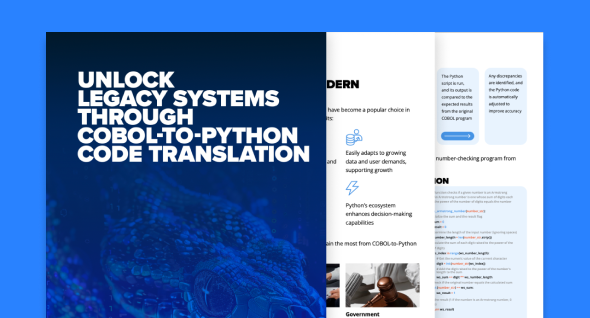
Don't want to miss a thing?
COBOL Modernisation With LLMs: A Path to Transforming Financial Technology

Agentic AI integrates automated and semi-automated processes to reduce translation time by at least 50% with 85% execution-ready accuracy
The continuing role of COBOL in financial systems
Despite being in use for over six decades, COBOL remains a foundational component of critical financial operations. It supports vital systems such as stock exchanges, ATMs, and online banking platforms, with roughly 800 billion lines of code still active globally. Its relevance is particularly evident in the banking industry, where nearly 43% of systems rely on COBOL, especially among European institutions that favour stable and long-established IT practices.
The mounting risks of COBOL dependency in FSI
Relying on COBOL presents long-term concerns that can hinder growth and operational efficiency for financial services organisations.
- Developer shortages: The expertise gap continues to widen, with fewer developers entering the field, leading to labour shortages and higher staffing costs for maintenance.
- Security issues: Systems that were secure in the 20th century are now vulnerable to modern cyber threats, exposing institutions to data breaches and operational disruptions.
- Integration challenges: COBOL’s inflexibility and outdated architecture make it difficult to integrate with advanced systems necessary for digital transformation.
Data and personnel: obstacles to COBOL modernisation
Transforming COBOL systems into modern, adaptable frameworks involves many deeply rooted challenges:
- Loss of expertise: Retiring COBOL experts and a lack of comprehensive training programmes create a critical skills gap that puts system maintenance and updates at risk.
- Static data structures: COBOL relies on rigid, predefined data types and structures, making migration complex and time-consuming. Modern languages like Python or Java, which offer dynamic data architectures, require significant structural reconfiguration during translation.
- Legacy architecture limitations: Outdated environments, often accompanied by insufficient documentation, complicate replication tasks. Functions like IBM’s CICS transaction processing are particularly difficult to modernise without advanced compromises.
Overcoming barriers for modernisation success with agentic AI
Agentic AI integrates sophisticated LLMs to deliver a breakthrough approach to COBOL modernisation. Unlike traditional systems that require extensive manual intervention, this AI dynamically adapts to changing project requirements and autonomously optimises translation strategies:
- Intelligent automation: With minimal human oversight, agentic AI automates code analysis, planning, and translation. Built-in self-correction reduces errors and ensures a more streamlined workflow.
- Tailored processes: Agentic AI customises every translation to meet the specific needs of an organisation’s IT ecosystem, ensuring compatibility and operational efficiency.
- Enhanced precision: By employing state-of-the-art cognitive models, over 85% of translated code can execute accurately without requiring additional adjustments or rewrites.
First modernisation results: rapid cost savings from pilot projects
SoftServe has successfully implemented a prototype leveraging agentic AI, demonstrating significant operational and financial windfalls:
- Faster execution: The integration of automated tools accelerates the translation process by at least 50%.
- Reduced costs: Organisations can save 15%-20% on project expenses by minimising the need for specialised development staff and excessive manual processes.
- Improved reliability: Translated code achieves exceptional performance, enabling deployment with minimal technical support.

Download now
Beyond COBOL: the future of financial technology
For financial institutions, upgrading legacy COBOL systems is not just an opportunity; it is a necessity for maintaining a competitive edge in an industry defined by rapid digital evolution. Solutions with agentic AI are setting a new precedent for modernisation efforts by not just improving efficiency but rethinking the entire approach to legacy technology.
By leveraging agentic AI’s innovative capabilities, organisations can address pressing pain points — including talent shortages, compatibility challenges, and security vulnerabilities. More importantly, they can future-proof their IT infrastructure in an increasingly disruptive financial ecosystem.
It’s time to reimagine your financial systems. Reduce risk, lower costs, and ensure seamless integration with modern frameworks through intelligent automation.
 Start a conversation with us
Start a conversation with us
